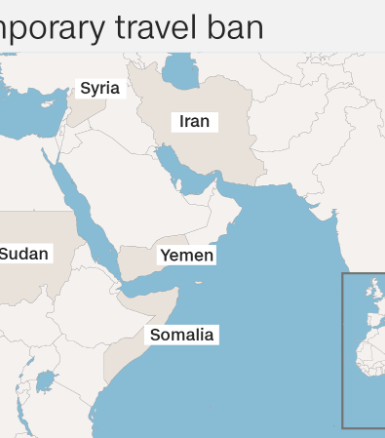
Travel Ban Returns
The heavily debated and contested travel ban went into effect Thursday at 8 p.m.. This version of the ban is more specifically tailored, the key for foreign nationals trying to enter the country is going to be their relationships to established U.S. citizens. If foreign nationals cannot prove a bonafide relationship, they will be banned for 90 days, unless they are claiming refugee status, they will be banned 120 days.
After months of winding through the courts, the so-called “watered-down,” revised version of President Donald Trump’s fiercely litigated travel ban finally went into effect at 8 p.m. ET Thursday.
Less than an hour before the ban was slated to begin, an emergency motion was filed in federal court by the state of Hawaii, which contests the Trump administration’s plan to exclude certain categories of foreign nationals that the state believes are allowed to enter the country under existing court rulings.
Here’s what to expect for the implementation of version 2.0 of the travel ban:The test for foreign nationals under the Supreme Court’s ruling is whether one has a “credible claim of bona fide relationship” with either an entity (like a school or a job) or a person living in the US (such as a spouse).
A hotel reservation, for example, will not constitute a bona fide relationship under the executive order, but an academic lecturer invited to speak in the US will be exempt from the travel ban.
If you can’t sufficiently establish such a close relationship, you are banned for 90 days if you are from Libya, Syria, Iran, Somalia, Yemen and Sudan, and 120 days if you are a refugee from any country.
The new guidelines provide that applicants must prove a relationship with a parent, spouse, finacee, child, adult son or daughter, son-in-law, daughter-in-law or sibling in the US in order to enter the country.
Other family members — including grandparents, grandchildren, aunts, uncles, nieces, nephews, cousins, brothers-in-law, sisters-in-law, and any other “extended” family members will not be considered “close family” under the executive order.
For several hours on Thursday — prior to the executive order going into effect — administration officials had provided guidance that fiancees would not be considered “bona fide” relationships, but later reversed course, and fiancees are now exempt just like spouses.
The State Department criteria applies not only to visa applicants, but also to all refugees currently awaiting approval for admission to the US.
Steve
Steve is an affordable multifamily housing professional that is also the co-founder of Whiskey Congress. Steve has written for national publications such as The National Marijuana News and other outlets as a guest blogger on topics covering sports, politics, and cannabis. Steve loves whiskey, cigars, and uses powerlifting as an outlet to deal with the fact that no one listens to his brilliant ideas.



